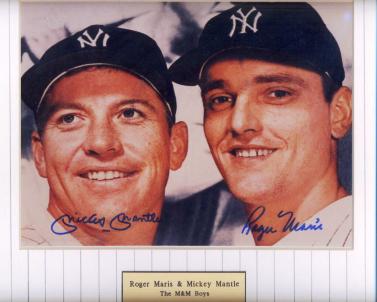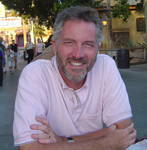Dial ‘M’ for Murder.
The “M&M Boys”.
The “Bronx Bombers”.
Y’see? If you hit a lot of home runs they give you a lot of cool nicknames.
I refer, of course, to Mickey Mantle and Roger Maris, who, as teammates on the 1961 New York Yankees, hit a staggering 115 pre-Steroid-Era home runs between them, and so thoroughly electrified the youth of this nation that forty years later one of those youths, comedian Billy Crystal, made a really good movie about it. (Yes, technically the moniker “Bronx Bombers” refers to the whole ’61 Yankee team, but since Mantle and Maris were the main bombers there’s no need to nitpick.) If you grew up—as both Billy C and I did—in America during the 50s and 60s, Mantle, Maris, and the Yankees were as thoroughly woven into the fabric of our lives as hula hoops, the Cold War, the Lone Ranger, and diving under our desks during air-raid drills.
And now another baseball season is fast approaching. Hard to believe, but it will be the 50th baseball season since that glorious ’61 campaign.
During the last year or so (perhaps it is the accidental kismet of the World approaching that 50-year anniversary, of their joint pursuit of Babe Ruth’s single-season home run record) a couple of very fine biographies have been published on the M&M Boys. One on Mantle, one on Maris.
Naturally I have already read them both. Which, combined with my being both baseball fan and baseball historian deluxe—not to mention being, as were both Mantle and Maris, from the Midwest—amply qualifies me to review both books for you here and now. Briefly.
The Maris bio is called ROGER MARIS, Baseball’s Reluctant Hero. One of its two authors (Tom Clavin being the other) is Danny Peary, who is also a loyal, devoted reader of LaVerne Online and this column. Danny sent me his book a few months ago, after I wrote a column calling for his hero Roger’s inclusion in the Baseball Hall of Fame. I was grateful for the opportunity. I read the whole thing in less than a week. The Mantle bio is called THE LAST BOY, Mickey Mantle and the end of America’s Childhood by Jane Leavy, a noted former Washington Post reporter and author.
First of all, let me state again that both books are fine, better than fine, both excellent examples of heavily researched and thoroughly entertaining Sports Biography. Both are very much worth reading. As meticulously researched as Peary’s Maris book is (and make no mistake, I know tons more about Rog than I did before I read it), Leavy goes even further in the Mantle book; I have never read a biography so extensively, intricately, and painstakingly researched in all my life. Leavy interviewed over 500 subjects to get Mantle’s full story, and it shows. She does stumble a couple of times, as in making some truly baffling errors, like flubbing up who starred in a major motion picture of the time and once getting Mantle’s birthday wrong. But those are more errors of poor concentration and poor proofreading than poor research.
Writing-wise, they are both fun books to read. Peary gets points from me for his consistently economical, spare style. Conversely, Leavy’s flowery lyricism often goes off the deep end, often using words and phrases so obscure it’s like she’s trying to impress us with how erudite she is. Frankly, when someone as literate, well-educated, and long-lived as I am has to continually run for the dictionary, you know the author is trying too hard and has overreached. But since the Mantle book is, on balance, so very good, I can forgive her for occasionally going over the top with all the unnecessary ten-dollar words.
But what I’m not sure I can forgive her for, is for how she did something she admittedly threatened to do in her title. She not only ended America’s childhood, she ended my childhood. At least as it pertains to Mickey Charles Mantle.
Every serious baseball fan and even most casual fans are aware, to some degree, of Mantle’s myriad, well-documented shortcomings. It’s no longer a secret. We all know The Mick had major problems with alcohol, womanizing, and parental absenteeism. I guess it comes back to that key word: DEGREE. The degree to which Leavy exposes us to Mantle’s off-field persona is not only staggering, it’s sobering. In other words, I had no idea how bad it was. How bad he was….
Do we need this much information about our sports heroes? I mean I don’t mind a bit a good tell-all about a politician or a criminal or a movie star, but sports heroes? For instance, I didn’t need to know {Spoiler Alert; stop reading right now if you don’t want to know any more bad stuff about Mickey} that the hip infection which caused Mantle to drop out of the ’61 home run chase was the result of an injection delivered by a quack to try to cure him of gonorrhea. Speaking of gonorrhea, I didn’t need to know that The Mick often claimed to have set a record by contracting “the clap” six years running. I didn’t need to know just how gigantic the cheating numbers were, pertaining to how many hundreds of women he bedded over the years while his wife was a thousand miles away raising their sons by herself. I didn’t need to know just how much of an enabler Mantle was to making alcoholics out of those four sons when they grew into adulthood, actually getting blind drunk with them on many occasions. And perhaps worse than all of that, I didn’t need to know how mean, vulgar, abusive, and dismissive he could be to people, especially when he had been drinking. (To be fair, it’s equally fascinating the level of love and idolatry showered upon Mantle by his teammates over the years. He was, by all accounts, the most loyal, giving, helpful, personable, and accessible teammate ever, perhaps an intentional contrast to the cruel aloofness that Joe DiMaggio foisted upon Mickey as a rookie in 1951. No less than six former Yankee teammates named their sons Mickey, and that number might be on the low side. That’s quite a legacy too.)
I guess it’s obvious I enjoyed the Maris bio more than the Mantle bio. I did. And the credit and/or fault goes to neither author. The credit goes to Maris, the discredit to Mantle. The more I read about Maris, the more I came to appreciate the man’s quiet courage as he endured essentially unendurable pressure, gallantly pursuing a record no one wanted him to break. And all the while he remained scandal free, a fine family man, and temperate in his habits; the one forgivable exception being the cigarette smoking which ultimately killed him.
The more I read about Mantle the more I felt sorry for him and the less I liked him.
Anyway, both books are keepers. Google them both up and put in your order. Just be careful with the Mantle book, don’t go into it with any illusions, you’re in for a tough fight. Prepare yourself, gird your loins. Proceed with caution. Be careful.
I just wish I didn’t know about all that stuff, that’s all. I mean there are some things a guy from the Midwest just doesn’t need to know.
meet….The Sports Philosopher!
Brad Eastland is an author, historian, film buff, undiscovered fictioneer, and protector of the sacred church of baseball. Brad’s other recent columns for LaVerneOnline can be found in Sports under ‘The Sports Philosopher’ and also in Viewpoint under ‘Brad Eastland’s View’. Brad has also written 4 novels and over 20 short-stories. Samples of his best fiction work can be discovered by clicking the delightful yet unappreciated links below:
http://www.bosonbooks.com/boson/fiction/basket/basket.html
http://www.bosonbooks.com/boson/freebies/freebies.html (see U.K. JOURNAL)



Leave a Reply